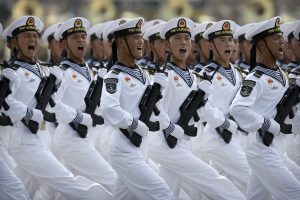Among all the security issues in the Indo-Pacific, Taiwan and the Taiwan Strait have occupied more than their share of global attention in recent years. This has been especially true since 2018, when the U.S.-China trade wars began to intensify.
Within this security context, Beijing’s position on Taiwan is so consistently aggressive and contentious as to leave little scope for other nations to find a way to get along with China. And of course, Taiwan is hardly the only security issue involving China. Beijing protests at practically any and all international criticisms aimed at incidents involving or originating from China. In recent years, its hard maneuvering have created a stir within regional and global security communities, and as recent news has made clear, this has complicated the development of the defense policies of those nations affected.
Japan, itself a major economic and democratic power in the region, as well as America’s closest regional ally and a close neighbor of China, has not been excepted. Indeed, Japanese defense policy has increasingly been shaped by China’s actions over the last decade. One noteworthy foreign affairs change in Japan in recent years has been the development of a revised position on China and Taiwan that is almost the exact opposite of its earlier “ambiguous” policy. Japan’s previous “partially China-leaning” policy was the product of a position it had maintained from 1972 (when diplomatic relations with China were restored). That unusual position could be described as being based on the psychological principle of: “maintain ambiguity—say nothing and do nothing—on any China issue.” However, starting around 2015 under Prime Minister Shinzo Abe, Japan moved away from those old principles and fashioned a new China/Taiwan policy that reflected its own judgment in response to China’s growing inflexibility.
As for the innumerable China-related maritime issues, such as in the East and South China Seas, as well as the Free and Open Indo-Pacific Concept, Japan has been on the same page as the United States during the last two decades. In contrast, European democracies were not fully in step with U.S. policy on China. Much of the gap between the United States and Europe was the result of then-U.S. President Donald J. Trump’s America First policy, which reduced emphasis on foreign alliances and cooperation. However, China’s brutal oppression of human rights within its borders, exemplified by its ongoing policies in Hong Kong and towards the Uighurs in Xinjiang, has quickly changed the outlook of leading European nations. Given these abuses in China, European leaders that have traditionally placed human rights as a key social value of their communities changed their China policies from silent disagreement to active opposition. In other words, human rights as an indisputable universal principle overrode the economic benefits that might accrue to Europe if it maintained close and uncritical economic relations with China.
And so Japan and the United States, joined by leading European democratic nations, have begun expressing strong and clear concerns about China’s human rights issues. Anti-China perceptions, triggered its actions in the human rights arena, have subsequently gained momentum, extending into other key areas: China’s unilateral and coercive moves in maritime theaters, as well as President Xi Jinping’s determination to unify Taiwan by any means. Democratic nations see Xi’s position on Taiwan as a major plank of his Chinese Dream, or the “great rejuvenation of Chinese nation.” The concern for these countries is that this may involve the use of military force—especially if external powers try to intervene. For China’s neighbors, the situation increasingly recalls the historical authoritarianism of the Middle Kingdom. There is mounting concern over the intent and future actions of Xi’s China.
Ironically, Beijing’s foreign policy has firmly united democratic powers that might otherwise have been at odds. A series of official statements have been issued during many high-level meetings involving democratic nations. These included the Japan-U.S. 2+2 (March), Japan-U.S. Summit (April), the QUAD Summit (May), and the G-7 Summit (June). Taken together, they reveal strong and explicit concerns over China’s human rights actions and harsh security policies. Finally in July, Japan’s Defense White Paper, “Defense of Japan 2021,” sent a clear signal to China by observing “the security of the Taiwan strait has a direct impact on the security of Japan.” Of note, Taiwan-related issues were highlighted as a common theme in these various statements and documents.
Surprising very few, China has responded aggressively. The responses have shared familiar themes: “Cold-war mentality”; “The internal affairs of China/non-intervention in the domestic affairs of China”; and “Intentionally and willfully developed fake news to condemn China.” Using these three themes, China has sought to justify its position and to gain put the democratic nations in their place. However, no matter how much it touts them, these themes cannot dispel the rising doubts and suspicions of other nations. In the eyes of democratic nations, almost all of China’s actions look self-righteous, arrogant, pushy and coercive.
It is a natural response, then, for democratic nations to ask straight questions and express their doubts directly to China. Yet Beijing remains recalcitrant. Its preferred approach is to use its economic and military might to push back on the doubters and forcibly deflect hard questions. Without question, democratic nations do have their own misunderstandings and biases on China, and China does have points to make. However, China’s current wolf warrior diplomacy is preventing constructive communication.
The simple fact is that China can’t control the world by forcing on it a “Chinese way” that originates from an obsolete Sino-centric philosophy and is also a product of the glorious so-called “great revival of the Chinese nation.” China will at some point need to increase its appreciation of, and respect for, international norms, rather than just upholding those norms that are unique to itself.

































